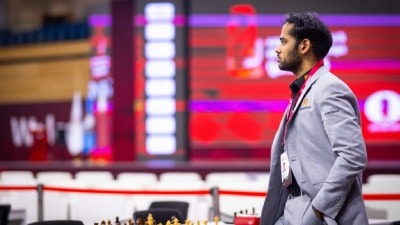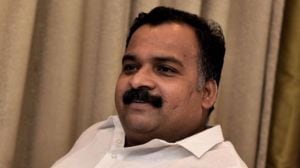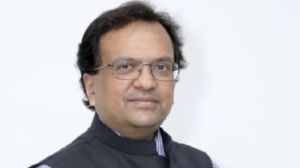Conned by the confessional?
8226; In photographs splashed around the world media, Abdul Qadeer Khan looks contrite. Pakistan8217;s powerful and cosseted national hero...

8226; In photographs splashed around the world media, Abdul Qadeer Khan looks contrite. Pakistan8217;s powerful and cosseted national hero has just apologised to his nation, taking full responsibility for 8216;8216;errors in judgement8217;8217;, live on PTV. Hours earlier, he looks, well, contrite as he sits across Pervez Musharraf, who looks stern.
In the US and British media, they aren8217;t veiling their scepticism about those photo ops. They8217;re talking of the deal between the scientist and the government. It is a 8216;8216;polite fiction8217;8217; the White House may be willing to live with 8216;8216;if it is the only way to keep a close ally in power while dismantling the Khan trading network8217;8217;, said the NEW YORK TIMES of the choreography in Pakistan to absolve the government of blame.
Washington can 8216;8216;ill afford to court a showdown with General Musharraf8217;8217; wrote the CHICAGO TRIBUNE. Too much pressure could lead to chaos or an 8216;8216;extremist regime8217;8217; . The DAILY TELEGRAPH even extended sympathy to Washington and allies. The Bush Administration would accept any pardon of Khan 8216;8216;through gritted teeth8217;8217;. Bush, it said, may be in the throes of one of the most striking contradictions post September 11.
But the WASHINGTON POST was fully outraged. Its report denounced the deal through which Khan goes unpunished. Editorials lashed out at Pakistan8217;s 8216;8216;Nuclear Crimes8217;8217;, and at Washington8217;s apparent willingness to buy the cover-up. 8216;8216;Perhaps there is no alternative to a relationship with the general8217;8217;, but stopping Pakistan8217;s proliferation is 8216;8216;vital to US security8217;8217;, it cannot be 8216;8216;left to Mr Musharraf to decide how or whether it will be done8217;8217;.
On cue, Mr Musharraf held a press conference to declare a loud 8216;8216;Negative to all three8217;8217;. He ruled out handing over documents from Pakistan8217;s investigations to international nuclear inspectors, ordering an independent investigation into the Army8217;s role, allowing UN supervision of Pak nuclear weapons. The NYT drummed up empathy: Musharraf was clearly playing to his domestic audience 8212; he spoke in Urdu and wore his commando uniform.
8216;8216;My country8217;s loose nukes underscore a global danger that may already be out of control8217;8217;, despaired Pervez Hoodbhoy, professor of nuclear physics. In the WASHINGTON POST, he wrote Pakistan must put its nuclear house in order and as the world8217;s only superpower, the US must take the lead 8212; 8216;8216;by reducing its own nuclear arsenal, as well as dealing with all proliferators, including its ally Israel, at the same level.8217;8217;
And the GUARDIAN sent out a bald warning: 8216;8216;Rogue states everywhere will watch with interest how Washington reacts to this scandal8217;8217;.
The other WMDs
8226; The timing is piquant. Hard evidence of Pakistan8217;s illicit WMD-related trade comes along at the precise moment when western governments are most starkly confronted by their failure to find WMDs in Iraq.
A media storm has raged on both sides of the Atlantic. Bush and top national security officials are in a desperate scramble to contain the fallout from David Kay8217;s report. The former chief weapons inspector concluded that Iraq had no WMDs on the eve of the US-led invasion.
In Britain, Blair8217;s full exoneration by the Hutton report on the charge of 8216;8216;sexing up8217;8217; intelligence on Iraq hasn8217;t got him off the hook. There8217;s a furious newspaper backlash to Hutton.
The GUARDIAN sighted more than just coincidence in the proximity of the two WMD stories. 8216;8216;Where was the intelligence that should have exposed this incredibly dangerous nukes-for-cash racket?8230; Where were those political leaders8230;?8217;8217; They only had eyes for Iraq. Bush and Blair were 8216;8216;simply looking the wrong way8217;8217;.
By all accounts, this storm is only begun.
- 01
- 02
- 03
- 04
- 05































